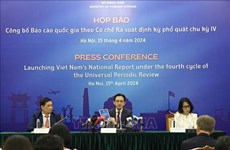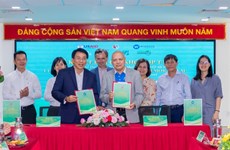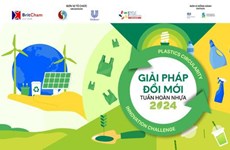WWF calls for biosphere reserve
The World Wide Fund for Nature has recommended developing coastal areas in the
Mekong River into a world biosphere zone.
The World Wide Fund for Nature has recommended developing coastal areas in the
Mekong River into a world biosphere zone.
Vietnam should seek recognition from the United Nations Educational, Scientific and Cultural Organisation (UNESCO) as a World Biosphere Reserve for the coastal areas of Soc Trang, Tra Vinh, and Ben Tre provinces, it said.
To achieve this, the country should reorganise production and improve the living standards of people in the target areas so that they have a vested interest in their conservation and development, it said.
The NGO stressed the need for a project to manage the coastal areas in the three provinces in such a way that their socio-economic development path is appropriate for the situation caused by climate change.
Soc Trang, Ben Tre and Tra Vinh have a 202-kilometre coastline that plays a decisive role in their economies and the lives of their 17 million people.
The provinces, situated at the mouth of the Mekong River , are rich in alluvium, mangrove, and other bio-diversity, and have enormous economic potential, making the impacts of climate change potentially more devastating.
A WWF expert, Hoang Viet, said the biosphere zone would bring much benefit to the delta region.
It would be contiguous with existing biospheres like Ca Mau, Can Gio, and Kien Giang, and create a “natural shield” that would protect the delta from natural calamities and restore the coastal forest ecology and fish stocks, he said.
This would also result in increasing residents’ incomes, he said.
“In addition to their ability to prevent soil erosion and act as windbreaks, sandy saline forests also absorb carbon dioxide,” Viet said./.
Vietnam should seek recognition from the United Nations Educational, Scientific and Cultural Organisation (UNESCO) as a World Biosphere Reserve for the coastal areas of Soc Trang, Tra Vinh, and Ben Tre provinces, it said.
To achieve this, the country should reorganise production and improve the living standards of people in the target areas so that they have a vested interest in their conservation and development, it said.
The NGO stressed the need for a project to manage the coastal areas in the three provinces in such a way that their socio-economic development path is appropriate for the situation caused by climate change.
Soc Trang, Ben Tre and Tra Vinh have a 202-kilometre coastline that plays a decisive role in their economies and the lives of their 17 million people.
The provinces, situated at the mouth of the Mekong River , are rich in alluvium, mangrove, and other bio-diversity, and have enormous economic potential, making the impacts of climate change potentially more devastating.
A WWF expert, Hoang Viet, said the biosphere zone would bring much benefit to the delta region.
It would be contiguous with existing biospheres like Ca Mau, Can Gio, and Kien Giang, and create a “natural shield” that would protect the delta from natural calamities and restore the coastal forest ecology and fish stocks, he said.
This would also result in increasing residents’ incomes, he said.
“In addition to their ability to prevent soil erosion and act as windbreaks, sandy saline forests also absorb carbon dioxide,” Viet said./.













